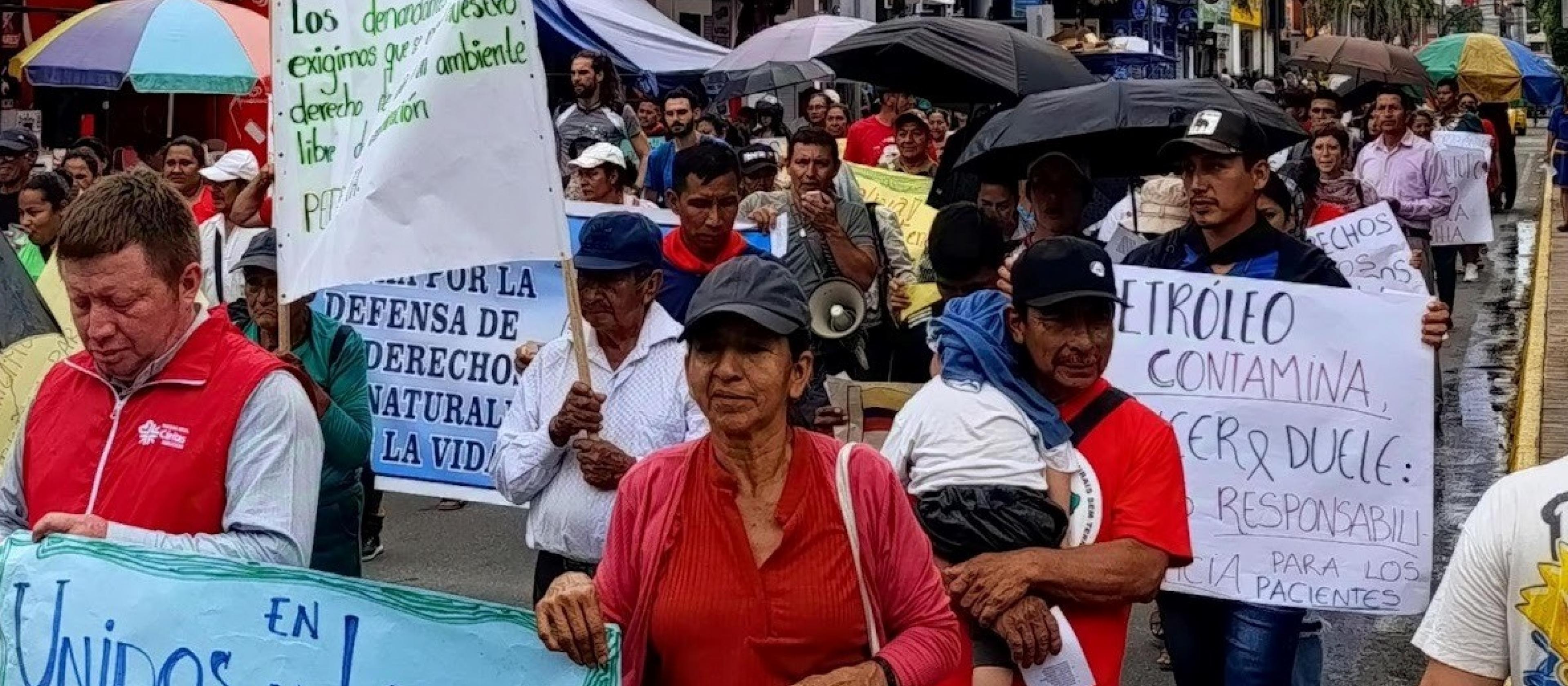CIVIL SERVICE WITNESSES: ALICE'S STORY
‘’To live and fight in the wounded Amazon’’ , di Alice Corbo, Corpi Civili di Pace, Lago Agrio (Ecuador)
Lago Agrio. Sour Lake. Literally, the translation from English—from Texas to Ecuador. A place that came into being about fifty years ago for Texaco’s oil exploration—now Chevron—which began scouring the northeastern area of the country in 1963 and drilled the first oil well in all of the Amazon the following year. Today, this is where the urban center of Nueva Loja stands—the capital of the Lago Agrio canton, in the province of Sucumbíos.
Texaco was a major American oil company, founded in 1901 as the Texas Fuel Company and absorbed—exactly a century later, in 2001—by Chevron Corporation, a multinational operating in the energy sector, specializing in oil and gas.
From the 1960s to the 1990s, this company deliberately polluted Ecuador’s Amazon region with over sixty billion liters of toxic water and more than six hundred thousand barrels of oil spilled into nature, over a thousand kilometers of roads covered in oil, and millions of cubic meters of gas burned, causing the most severe environmental and social disaster in history.
Despite Texaco-Chevron’s economic, political, and media power, despite international arbitration and pressure from local politics, the Amazonian peoples, together with Udapt—Unión de Afectados y Afectadas por las Operaciones Petroleras de Texaco—have resisted for over thirty years. In three decades of global struggle for justice, supported by numerous international NGOs, Udapt managed to obtain a judicial ruling in Ecuador against the multinational, which should compensate damages amounting to nine and a half billion dollars to the Ecuadorian Amazon.
However, this ruling—ratified by three higher courts—has not been enforced.
My name is Alice, I am 27 years old, and I have been here for almost four months, with six more to go.
The reason I will stay so long in such a peculiar place is precisely Udapt’s struggle, with which I will work until March of next year as a communicator, thanks to a Civil Peace Corps project.
Beyond my volunteer work, I came here to discover a piece of Latin America, a territory of ancestral wisdom that I had idealized for years.
The problem for us idealistic people is the clash with reality: my Latin America does not match the literary and cinematic version of Magical Realism. Yet, I do not hold Ecuador responsible for representing such a diverse continent.
Due to the escalation of violence in the country in recent years and the dark history—like the oil in the subsoil—of the town where I am, adapting to this reality is rather complex; it feels full of pitfalls and paradoxes.
With my fellow adventurers, we have ironically nicknamed Lago Agrio “L.A.,” although the similarities with Los Angeles are few or none.
The urban center is a gigantic and chaotic open-air bazaar: there is no cinema or bookstore, no gathering places—just countless small shops all alike (a coastal legacy), lined up one after the other. The shop assistants—almost always women—greet you with “a la orden” (a colonial legacy) as you pass by, inviting you to enter and spend your free time shopping and paying homage to the capitalist system, which, in a globalized world, has managed to make inroads even into the planet’s green heart.
Since being here, I have had to reflect deeply—and adopt a new perspective—on all my political beliefs as a white European, and I cannot deny feeling significant frustration in this regard.
Fortunately, in this challenging adaptation, there is a family—not the one of blood or choice waiting at home, but the new and welcoming hogar we have created with the other volunteers.
Meri, Sofi, Piyumi, Silvia, and Davide are the people with whom I am sharing the wonderful intimacy of daily life in the Amazon, along with the awareness that everything we are experiencing will be difficult to recount upon our return. This is exactly what happens when we go through a significant phase of our lives: only those who experience it with us can fully understand what we have lived.
Nothing truly significant ever begins in May: for major beginnings, there is usually the calendar year or the academic year.
Yet it happened this way: in a May spring, my life changed—temporally, some would say—but for me, nothing is temporary, because I am a determinist. What does that mean? That even if I were to return to my life as it was before, it would never be identical to how it was before I left.
And I find that comforting. “Animum debes mutare, non caelum,” Seneca wrote to Lucilius. Yet a journey—or rather, an experience—like this certainly helps understand how to change the animum.
I am very grateful for all the difficulties I am facing because they remind me that I am alive and fortunate. And therefore, life must be celebrated, and a hand extended—if possible—to those less fortunate, to build a fairer world.
The Amazon is neither a myth nor a bucolic refuge: it is a living, wounded, and contradictory place that forces you to reconsider your certainties and confront your limits. I certainly will not change the course of history here, but this place will change me: every step, every encounter, every obstacle leaves a mark that will remain even when I am elsewhere.


